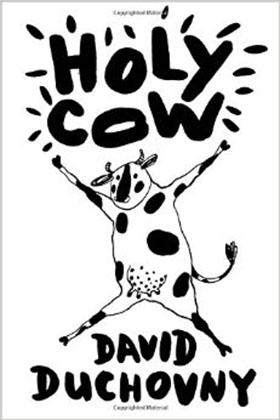
David Duchovny's
HOLY COW: A NOVEL
David Duchovny should be feeling sheepish about the demands his drawn-out puns and barn humor make on our indulgence.
(Farrar, Straus and Giroux, February 2015, Hardcover 224 pages, $24.00)

(Farrar, Straus and Giroux, February 2015, Hardcover 224 pages, $24.00)
David Duchovny originally intended his novel Holy Cow to be an animated movie, and I think it would have worked really well that way. It's a zany, freewheeling animal adventure with cartoonish characterizations that deals with an assortment of sustainability and animal rights issues, but is at heart a coming-of-age story. Unfortunately, the translation into novel form is rocky. Our first-person narrator, dairy cow Elsie, can't help loading her narration with an incongruous mélange of lame farm puns, pop-culture references, extended polemicizing and winking acknowledgements of her own cuteness.
Observe how she belabors a joke about her species being just as capable as humans are of thought and emotion: "I'm a cow, my name is Elsie, yes, I know. And that's no bull. See? We can think, feel, and joke." A little further on, she gives herself an authorial pat on the back for her savvy in including things like chapter titles and cliffhangers: "See what I did there? I left you on a poetic cliffhanger. And a chapter title again. Gives you a chance to take a break, maybe dog-ear a page, get something to eat, and when you come back the chapter heading will refocus you on the story. Like a Jedi, I tell you, a Jedi." A Jedi not.

Duchovny is, of course, best known for starring in the FOX network's hit sci-fi series The X-Files; and indeed, the premise of his novel could itself be something out of an X-File. It involves a group of farm animals hatching an elaborate scheme to escape their plight as livestock being raised to slaughter and relocate to countries where their species aren't eaten. Elsie wants to go to India because cows are revered there. Her companions, a pig named Shalom and a turkey named Tom, are set, respectively, on Israel and Turkey (using more dubious logic, Tom thinks he won't be eaten in a country named after his kind). Together they pull off a voyage of thousands of miles both on foot/hoof and by air, while wearing human disguises and consulting a smartphone and maps taken from the human farm family.
It all begins when Elsie discovers the horrors of modern industrial factory farming. One night, after slipping out of her enclosure to flirt with the bulls along with her "bff" Mallory, she wanders astray and catches glimpses, through a farmhouse window, of a TV news story on inhumane industrial-scale farming practices. She sees a montage of loathsome images we're all familiar with by now, showing chickens packed so tightly into their cages that their feet grow around the wire and have to be amputated, pigs kept hundreds to a pen and cattle shot with captive bolt guns and hung on hooks to be dismembered.
Elsie is stricken by what she sees and takes little comfort in the fact that she's at least a pasture-raised cow rather than a prisoner of an industrial meat farm. She's still been birthed, raised and fattened for the sole purpose of one day being butchered and eaten. She now realizes that her own mom and dad, who left her inexplicably some years back as all cow parents somehow seem to do, were killed and eaten.
But her mood does a U-turn when she sees a Discovery Channel special on sacred cows in India. It shows how Hindus worship and dote on cows, decorating them with ornate jewelry and makeup. Suddenly it dawns on Elsie that she has an out. She secretly sets to work on an escape plan; but since word spreads quickly on a farm, it isn't long before Shalom and Tom are in on it too. The three of them spend weeks collecting maps, encyclopedias, credit card information and a smartphone, then hit the road for the nearest airport.
The adventure that follows is the definition of surreal. By far the most over-the-top plot development comes when Shalom manages to unite Israelis and Palestinians with the help of Joe Camel, who is atoning for having encouraged people to smoke as the former mascot for Camel cigarettes. We later learn that Shalom and Joe are in the running for the Nobel Peace Prize for their work.
In the course of their journey, Elsie goes on numerous tirades about humankind's destructive ways–and while her annoying qualities as a narrator dampen her effectiveness as an environmental agitator, the points she makes are spot on. She faults us above all for not recognizing that what we do to the biosphere comes back to haunt us. Cows, much like adherents of James Lovelock's Gaia theory, believe Earth to be a single living being with a consciousness and feelings. Elsie eloquently admonishes her human readers, "You can't just wear the food chain around your neck like a bauble or necklace. You're part of it and if you keep treating it with disdain, that chain will strangle you."
Duchovny, who completed a master's and part of a Ph.D. in English literature at Yale, says he has other writing ideas he'd like to develop. I’m a fan of his and really wanted to believe in his first novel, so I'm willing to give him another chance.